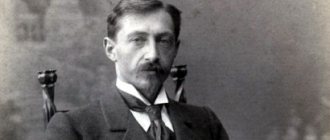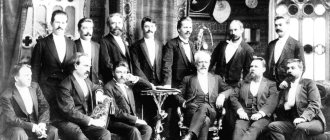Analysis of the play "Woe from Wit"
A new word in Russian literature of the early 19th century
Alexander Griboedov's comedy "Woe from Wit" is considered the first work of the realistic movement in Russian literature, despite the still noticeable influence of classicism.
The comedy also contains the aesthetics of romanticism, especially noticeable in the image of the main character. A characteristic feature of realism in a play is that the characters are socially motivated. They are a product of the society in which they live.
The language of comedy can also be attributed to Griboyedov’s innovation. He gives each of his characters an individual manner of speech. Therefore, they cannot be confused. With the help of sharp polemics in dialogues, the author shows the character and way of thinking of the characters. Many sayings are so aphoristic and unique that they have become popular sayings. Even after many years, they remain relevant to us. For example, the famous remark of the main character Chatsky: “I would be glad to serve, but it’s sickening to be served.”
History of the play
The author worked on the play for several years, from 1822 to 1824. However, the idea to write about the morals of society arose much earlier. According to one version, the impetus for the creation of the play was one of the aristocratic receptions that Griboyedov attended. He was greatly outraged by the way people bowed down to a foreign guest, because at that time there was a fashion for everything foreign. When the writer hinted that such behavior looked ridiculous and wrong, he was considered a crazy person. This story gives reason to consider Griboedov as the prototype of his main character, Chatsky.
When the work was completed, the author thought that he could easily publish it. But it turned out that there was no such thing as comedy. Therefore, during Griboedov’s lifetime, it was possible to publish the work only in fragments. Although handwritten versions quickly spread among the advanced reading public, and the writer gained fame.
The plot of the work
Alexander Chatsky, a young nobleman, arrives at the house of the Famusov family after a long stay abroad. His goal is to marry Sofya Famusova, with whom he grew up and was friends in childhood. But the girl greets him coldly because she is in love with another man. Chatsky does not want to give up, especially since Sophia’s chosen one seems to him an unworthy person. There are only two storylines in the play - romantic and social. The first subsequently flows into the second. Trying to win Sophia's hand, Chatsky gradually becomes disillusioned with her, because she is no different from the rest of the conservative, decaying Moscow society. The main character has a brilliant mind, but in this society he is useless, because only servility and cunning are valued here. Chatsky's eloquence and his progressive ideas are perceived as the ravings of a madman. As a result, the main character leaves Moscow.
Theme, problems and main idea of the play
The main themes of the work include: a realistic depiction of the life and morals of the society of nobles contemporary to the author; a story of unhappy love; the progressive protagonist's confrontation with society.
In the play, the author raises such important problems as: ignorance, careerism, arrogance, serfdom, admiration for rank, imitation of everything foreign.
The main idea of the play: exposing the moral baseness and wretchedness of a serf-dominated society, in which progressive ideas are not perceived.
Nevertheless, the author's sympathy is on the side of people like Chatsky. Therefore, despite the defeat of common sense in the person of the hero, the writer hoped that changes would soon come.
New in blogs
No. 731. What does fiction teach?
Fiction is an extremely important part of culture. It is impossible to even imagine a society without books! And it is quite natural that after the work of fiction the question arose: “Why do we need fiction?”
By publishing this article, I will try to answer this question. And we will have to start from those historically distant times, when in the evening after a hard day the inhabitants of the cave gathered around the fire. There was some time left before bed, what to do with it? I dare to suggest that the cave evenings around the fire were dedicated to some kind of stories. This was the seed from which many, many years later the most magnificent trees grew - “The Forsyte Saga”, “Quiet Don”, “The Master and Margarita” and many other interesting works of literature!
What was the main quality of those first prehistoric campfire stories? Entertaining! If there was another storyteller who told a boring story, he was driven away! I dare to say that it is precisely entertaining and captivating that is the main quality of any prosaic work of art from any historical era.
It is curious that in correctional camps and prisons, it is skillful storytellers who have enjoyed and continue to enjoy the favor of camp bosses.
I am 78 years old, I have read a lot of books. And I was always surprised by people who looked for some meaning in works of art! I have always believed and still believe that the main purpose of fiction is entertainment! And nothing else.
For those who are looking for some meaning in novels, I want: What is the meaning of Bulgakov’s novel “The Master and Margarita”? If there are ten people who dare to answer this question, then all the answers will be different! That's the meaning of the novel for you! Take a glass: what is it for? It is very convenient to drink from it! So what is the meaning of the novel “The Master and Margarita”? None! This is a wonderful, entertaining piece of art! And nothing more!
Remember where the most boring novel “What to do?” begins? Chernyshevsky? From a corpse! Nikolai Gavrilovich wrote not for the dark, but for the educated person! And he knew the meaning of entertaining.
You can often hear that literature teaches. God! What have the thousands of books you've read taught you? And here’s what Anton Pavlovich Chekhov said: “You want me, portraying horse thieves, to say: horse theft is evil. But this has long been known even without me,” he wrote to A.S. Suvorin on April 1, 1890.
What is the meaning of the novel Anna Karenina? One young lady in the days of my youth said this: “The novel “Anna Karenina” is about the sinfulness of adultery!” Chekhov would like her!
Remember the biographies of the most disgusting criminals of high intellectual rank! They're not fools! And they will give a head start to any powerful reader. And what did literature teach them?
I long ago came to the conclusion that educated people look for meaning in literary works! There are no thoughts of their own, so they read books, looking for meaning in them, turning fiction into a textbook of life. For me, literature is the greatest miracle that adorns life! That's all! But there is one more point: you want to reread some novels not only for entertainment, but also for reflection. Yes, for reflection, but not for searching for meaning.
The Mystery of the Broken Rib
Scene from the play "Woe from Wit". Maly Theatre, Moscow, 1915 Billy Rose Theater Collection / New York Public Library
Here Skalozub tells an anecdote about Countess Lasova:
Let me tell you the news: there is some kind of Princess Lasova here, a horsewoman, a widow, but there are no examples of many gentlemen riding with her. The other day I was completely bruised; Joke didn’t support it; he thought there were flies. - And without that, as you can hear, she is clumsy, Now she is missing a rib, So she is looking for a husband for support.
The meaning of this anecdote is an allusion to the biblical legend about the origin of Eve from the rib of Adam, that is, the secondary nature of woman in relation to man. In the Moscow world, everything happens exactly the opposite: the primacy here always and in everything belongs to women. Matriarchy reigns in Griboyedov's Moscow, the feminine principle is consistently replacing the masculine. Sophia accustoms Molchalin to music (“Now you hear a flute, now it’s like a piano”); Natalya Dmitrievna surrounds the completely healthy Platon Mikhailovich with petty care; Tugoukhovsky, like a puppet, moves according to his wife’s commands: “Prince, prince, here,” “Prince, prince!” Back!" The feminine principle also prevails behind the scenes. Molchalin’s high patron turns out to be Tatyana Yuryevna. Her prototype was Praskovya Yuryevna Kologrivova, whose husband, according to the memoirs of the Decembrist Zavalishin, “asked at a ball by one high person who he was, was so confused that he said that he was Praskovya Yuryevna’s husband, probably believing that this title is more important than all his titles.” Famusov tries to influence Skalozub through Nastasya Nikolaevna and recalls some unknown to the reader, but important to him, Irina Vlasevna, Lukerya Aleksevna and Pulcheria Andrevna; The final verdict on what happened in the Famusovs’ house must be passed by Princess Marya Aleksevna.
“This female regime, to which the characters in Woe from Wit are subject, clarifies a lot,” writes Yuri Tynyanov. — Autocracy was female for many years. Even Alexander I still took into account the power of his mother. Griboyedov knew, as a diplomat, what influence a woman had at the Persian court.” “Women’s power” and “male decline” become signs of the times: Griboedov describes that turning point in Russian life, in which the courageous life of 1812 becomes a thing of the past, and gossip turns out to be more important than actions. In this situation, slander against Chatsky arises.
The mystery of Molchalin's origin
Here is the story of the very successful career of the “rootless” Molchalin:
He warmed up Bezrodny and brought him into my family, gave him the rank of assessor and took him on as secretary; Transferred to Moscow through my assistance; And if it weren’t for me, you would be smoking in Tver.
Is assessor good or not so good? The rank of collegiate assessor (VIII class of the Table of Ranks) gave the right to hereditary nobility, that is, at least equated Molchalin with Chatsky, and corresponded to the military rank of major. The collegiate assessor Kovalev, the hero of Gogol’s “The Nose”, liked to call himself a major: “Kovalev was a Caucasian collegiate assessor . He had only been in this rank for two years and therefore could not forget it for a minute; and in order to give himself more nobility and weight, he never called himself a collegiate assessor, but always a major.” Griboyedov himself, when he wrote “Woe from Wit,” was a titular adviser (IX class).
Alexander Yuzhin as Famusov in the play “Woe from Wit.” Maly Theatre, Moscow, 1915 Billy Rose Theater Collection / New York Public Library
What is the secret of Molchalin’s success? It can be assumed that partly because he was born in Tver, and, for example, not in Tula or Kaluga. Tver is located on the road connecting Moscow and St. Petersburg; the manager at the government office, Famusov, probably passed through Tver more than once, and perhaps some efficient local fellow (the son of the station master?) was able to successfully provide him with some kind of service. And then, using the patronage of Famusov and Tatyana Yuryevna, Molchalin quickly and very successfully began to move up the career ladder.
Socially, Molchalin begins his journey precisely as a “little man” who does not reconcile himself with his position, but strives with all his might to become one of the people. “This is a man who, in swaddling clothes, has known the onslaught of fate and is therefore ready to give himself into slavery to anyone and anywhere, ready to worship both the true God and an empty idol, having neither the ability nor the skill to penetrate into the essence of things. <…> Everything in the activities of these people is imprinted with lack of understanding and a firm determination to retain for themselves the miserable piece that fate threw out to them,” Saltykov-Shchedrin wrote about Molchalin.
The mystery of Aunt Sophia and Chatsky's humor
Making fun of Moscow, Chatsky sarcastically asks Sophia:
At conventions, at big ones, on parish holidays? A mixture of languages still prevails: French with Nizhny Novgorod?
Why is the French language mixed with the Nizhny Novgorod dialect? The fact is that during the War of 1812 this became a reality: Moscow nobles evacuated to Nizhny Novgorod Vasily Lvovich Pushkin (the poet’s uncle and the poet himself), addressing the Nizhny Novgorod residents, wrote: “Take us under your protection, / Pets of the Volga banks.” .. At the same time, in a patriotic upsurge, the nobles tried to abandon French speech and speak Russian (Leo Tolstoy described this in “War and Peace”), which led to a comic effect - a mixture of French pronunciation with the Nizhny Novgorod Okanye.
No less funny were the lexical incidents (and not only those from Nizhny Novgorod!). Thus, the Smolensk landowner Svistunova in one of her letters asked to buy her “English lace in the style of drums (Brabantian), “a small clarinet (lornette), since I am close with my eyes” (myopic), “earrings (earrings) of pisagram (filigree) work, fragrant alambre perfumes, and for the decoration of the rooms - paintings from Talian (Italian) in the manner of Rykhvaleeva (Raphael) work on canvas and a tray with cups, if you can get them, with peony flowers.” In addition, it is possible that Chatsky is simply quoting the famous journalistic text from the time of the Napoleonic Wars, written by Ivan Muravyov-Apostol, the father of three future Decembrists. It is called “Letters from Moscow to Nizhny Novgorod”, and it contains a famous fragment about how the French language is mercilessly treated in the Moscow Assembly of Nobility:
“I stood in the middle of the hall; waves of people made noise around me, but alas!.. They all made noise in French. Rarely, rarely did a Russian word pop up. <…> Out of a hundred people among us (and this is the most moderate proportion), one speaks a fair amount of French, and ninety-nine speak Gascon; no less, everyone babbles in some kind of barbaric dialect, which is considered French only because we call it speaking French. Ask them: why is this? - because, they will say, it was introduced this way. - My God! - When will this come out? <…> Enter any society; A most amusing mixture of languages! Here you will hear Norman, Gascon, Roussillon, Provencal, Genevan dialects; sometimes Russian in half with the above. “Ears are withering!”
Mystery of August 3
Boasting of his successes, Skalozub mentions the battle for which he was awarded the order:
For the third of August; We sat down in a trench: He was given with a bow, on my neck. The lower orders, that is, the III and IV degrees, were worn in a buttonhole, and the order ribbon was tied with a bow, the orders of the highest degrees - on the neck. Skalozub emphasizes that he received a higher level award than his cousin, and that by that time he already had the rank of staff officer.
The exact date was named for a reason. Among Griboedov's contemporaries, who well remembered the Patriotic War of 1812 and the events that followed it, this phrase could not help but cause laughter. The fact is that no battle took place that day.
Sergei Golovin as Skalozub in the play “Woe from Wit”. Maly Theatre, Moscow, 1915 Billy Rose Theater Collection / New York Public Library
Franz II , took place in Prague - Holy Roman Emperor (1792–1806), reigning as Austrian Emperor under the name of Franz I., which was marked by many awards. Skalozub had no need to “sit in the trench.”
The static nature of Skalozub (“Wherever you order, as long as you sit down”) sharply contradicts the dynamism of Chatsky (“The wind, the storm swept by more than seven hundred versts; / And he was completely confused, and fell so many times...”). However, in the conditions of military service in the last years of the reign of Alexander I, it was Skalozub’s life strategy that turned out to be in demand. The fact is that promotion to the next rank was carried out when there were vacancies; if Skalozub’s more active comrades died in battles or were “turned off” for political reasons, then he calmly and systematically moved towards the rank of general:
I am quite happy in my comrades, Vacancies are just open; Then the elders will turn off others, Others, you see, are killed.
The secret of Sophia's dream
Alexander Yuzhin as Famusov and Vera Pashennaya as Sophia in the play “Woe from Wit.” Maly Theatre, Moscow, 1915 Billy Rose Theater Collection / New York Public Library
Here Sophia tells Famusov a dream that she clearly invented:
Then the doors opened with thunder. Some people, not animals, separated us - and tormented the one sitting with me. It’s as if he is dearer to me than all the treasures, I want to go to him - you drag him with you: We are seen off by the moaning, roaring, laughter, whistling of monsters! He shouts after him!..
What does all this even mean? Sophia invented her dream for a reason, but based on literature, namely a romantic ballad: the heroine finds herself in an otherworldly world inhabited by villains and monsters.
The object of parody for Griboedov here is, first of all, Zhukovsky and his free translations of the ballad of the German poet Bürger “Lenora” - “Lyudmila” (1808) and “Svetlana” (1811), in which dead suitors appear to the heroines and take them to the afterlife. Famusov has hardly read Zhukovsky, but Griboedov puts into his mouth a caustic maxim, very similar to the ending of the ballad “Svetlana”: “Everything is there, if there is no deception: / And devils and love, and fears and flowers.” And here is “Svetlana”:
Smile, my beauty, at my ballad; There are great miracles in it, There is very little in stock.
In Sophia’s dream, ballad cliches thicken: the innocent heroine and her lover are separated by a tormentor - a character from the afterlife (it is no coincidence that in the dream Famusov appears from under the opening floor). In the first edition, Famusov was completely described as an infernal hero: “Death on the cheeks, and hair standing on end.”
However, not only Sophia’s dream, but also her relationship with Molchalin resembles a ballad plot. Their love affair is modeled after Zhukovsky’s ballad “Eolian Harp” (1814). Minvana, the daughter of a noble feudal lord, rejects the claims of eminent knights and gives her heart to the poor singer Arminius:
Young and beautiful, Like a fresh rose - the joy of the valleys, A sweet-voiced singer... But not by birth, not a princely son: Minvana forgot About her rank And loved with her heart, Innocent, innocent heart in him.
Griboyedov parodies the picture of ideal love created by Zhukovsky. Poor singer Arminius seems to be replaced by the scoundrel Molchalin; the tragic expulsion of Arminius by Minvana’s father is the finale of the comedy, when Sophia overhears Molchalin’s conversation with Liza and expels the unlucky lover.
This parody is not accidental. In the literary debate between archaists and innovators, Archaists and innovators are supporters of opposing concepts of the development of Russian literature in the 1810s. The controversy between two literary societies - "Conversation of Lovers of the Russian Word" and "Arzamas" - revolved around the system of genres, language and style of literary behavior. Griboyedov adhered to the position of the younger archaists, who were very skeptical of Zhukovsky, and ridiculed the then fashionable daydreaming: “God be with them, with dreams,” he wrote in an analysis of the translations of the Burger ballad “Lenora” in 1816, “now no matter what book you look into, no matter what you read, a song or a message, there are dreams everywhere, and not a hair’s breadth of nature.” Molchalin is a parody of the sublime and quiet hero of sentimental stories and ballads.
The Mystery of the Yellow House
Mikhail Lenin as Chatsky in the play "Woe from Wit". Moscow Art Theatre, Moscow, 1911 Billy Rose Theater Collection / New York Public Library
Towards the end of the play, almost all the guests at the Famusovs’ ball are sure that Chatsky has gone crazy:
His uncle, the rogue, put him away in the madhouses; They grabbed me, took me to the yellow house, and put me on a chain.
Why is this so scary? The fact is that gossip about the hero’s madness, acquiring more and more new details. Gossip about Chatsky’s madness is developing like an avalanche. He himself is the first to utter the words about madness (“I can beware of madness...”), meaning his unhappy love; in the same sense, they are picked up by Sophia (“I reluctantly drove you crazy!”), and only on the third turn, enraged by Chatsky’s attacks on Molchalin, Sophia, out of revenge, says: “He’s out of his mind” - giving Mr. N. interpret these words in the literal sense. Further, the slander is spread anonymously through Messrs. N. and D., then acquires fantastic details in the remarks of Zagoretsky, who actually does not know Chatsky (“Which Chatsky is here? - A famous family. / I was once familiar with some Chatsky”). Griboyedov was well aware of the practice of spreading gossip and its influence on the destinies of people from his diplomatic activities, which essentially turns into a political denunciation. It is reported about Chatsky that he is a “farmazon” (that is, a freemason. Freemasons are freemasons; members of a secret religious charitable society that has spread throughout Europe since the 18th century. In 1822, by the highest order, all Masonic lodges in Russia were closed, Freemasonry became synonymous with freethinking .), “damned Voltairian”, “in the Pusurmans”, taken to prison, given up as a soldier, “changed the law”.
Accusation of insanity as a way to deal with a rival, an objectionable person or a political opponent was a well-known technique. So, in January 1817, rumors spread about Byron's madness, and his wife and her relatives started them. Slander and noise around the poet’s personal life spread almost throughout Europe. Rumors of madness also circulated around Griboyedov himself. According to the testimony of his biographer Mikhail Semevsky, on one of Griboedov’s letters to Bulgarin there is a note from the latter: “Griboyedov in a moment of madness.”
Twelve years after the creation of “Woe from Wit,” one of Chatsky’s prototypes, Pyotr Yakovlevich Chaadaev, will be accused of insanity. After the publication of his first “Letter” in the magazine “Telescope”, it was closed, and the Moscow police chief announced to Chaadaev that now, by order of the government, he was crazy. A doctor came to see him every day for an examination; Chaadaev was considered to be under house arrest and could only go for a walk once a day. A year later, the doctor’s supervision of the “patient” was removed - but only on the condition that he would no longer write anything.




